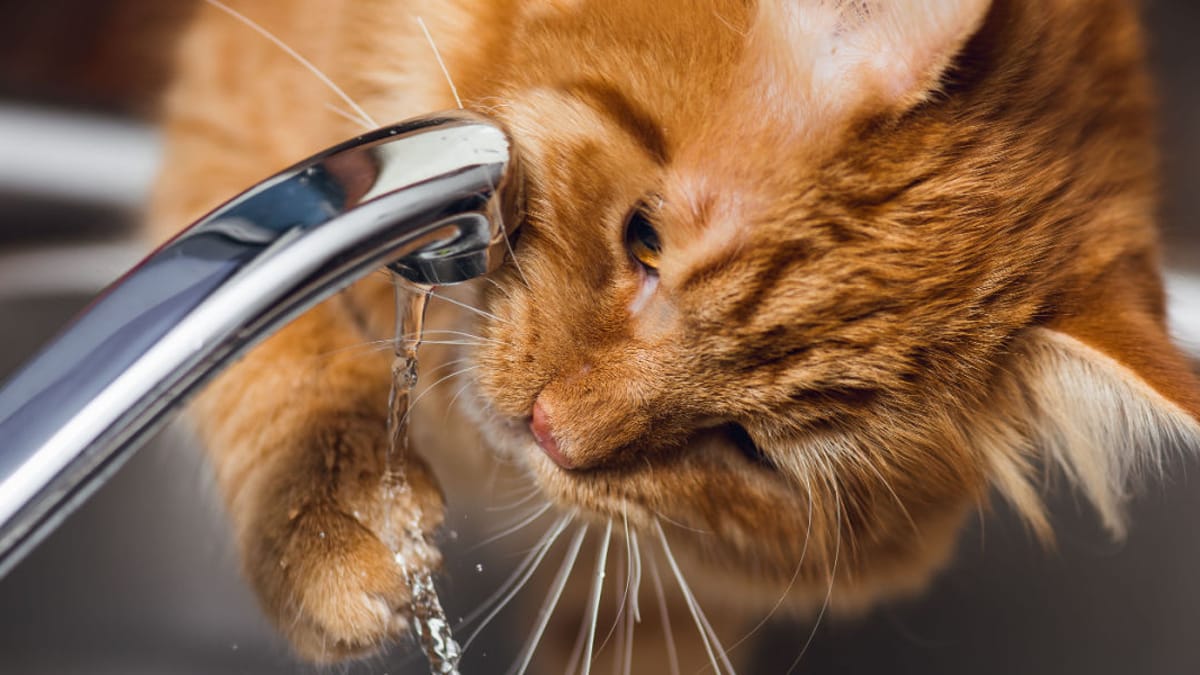L’renal failure in cats it is a pathology caused by a dysfunction of the kidney, which involves an accumulation of toxins in the body, thus leading the cat to be tired, inappetent and lazier than usual.
The kidneys are very important organs as their function is to filter the blood to expel toxic substances. If kidney function is compromised, the life of the affected person can become very difficult.
What is renal failure in cats?
There are two forms of renal failure in cats:
- acutewhen the kidneys change their functioning suddenly;
- chroniclewhen it manifests itself as a progressive disease.
Let’s see what are the symptoms, causes and treatments of this disabling disorder.
What are the causes of kidney failure in cats?
The The causes of renal insufficiency in cats, whether acute or chronic, can be different and some are incurable.
Kidney stones
The best known cause is the presence of kidney stones which can lead to the development of achronic interstitial inflammation (inflammation of the kidney leading to nephrosis), as well as its acute form.
glomerulonephritis
Glomerulonephritis (inflammation of the glomeruli that impairs filtering capacity of the kidney) can rapidly develop into chronic kidney disease, especially in adult male cats.
Kidney tumors
Finally, renal tumors or rare genetic diseases (such as amyloidosis or polycystic kidney disease) can also be the cause of renal failure in cats.
How to understand if the cat has renal insufficiency?
Symptoms of acute renal failure in cats
Symptoms of acute renal failure in cats they can strike at any age, leading the feline to be:
- pulled down;
- no appetite;
- apathetic;
- lethargic;
- with a weighted way of walking;
- il cat urinates littleor even not at all;
- vomiting and diarrhea may occur.
Symptoms of chronic renal failure in cats
Chronic renal failure, on the other hand, mainly affects i older cats and it is the result of the slow destruction of the cells of the kidney which is no longer able to adequately eliminate the toxins which thus accumulate in the body.
In this form of the disease the cat is:
How is kidney failure diagnosed in cats?
The moment we decide to subject our dog to a blood test to evaluate all values, a blood count will be used.
In the course of chronic renal insufficiency, the blood count will give us important information that we could define as characteristics of this pathology:
- normocytic and normochromic non-regenerative anemia;
- normal platelets;
- mature neutrophilia;
- lymphopenia.
In addition to blood diagnostics we can request athorough urine analysis of our cat.
The evaluation of osmolarity is important: we are talking about the total concentration of solutes in the urine, expressed as mOsm/kg (mmol/kg) of urinary water. Under physiological conditions, the specific gravity (PS) varies from 1007 to 1030 (normostenuria). In the course of chronic renal insufficiency, the specific gravity of the urine is defined as isostenuric: the weight is approximately 1008, i.e. equal to that of the plasma.
This denotes a clear impaired renal function with the production of cloudy, thick and foul-smelling urine.
What is the cure for kidney failure in cats?
The treatment of this insufficiency is prescribed by the vet and, as a rule, it is a question of administering to the cat some medicines which we will discuss below.
Pharmacological therapy must be associated with an adequate diet to ensure that the cat’s health returns to normal. It is possible to find in trade of specific products to feed cats affected by this disorder, however it is also possible to prepare tasty lunches at home for our furry little roommates.
Treat acute renal failure
The treatment of acute renal insufficiency in cats passes, once the cause has been found and eliminated, to re-establish the normal functioning of the kidney through the use of diuretic drugs (aimed at increasing the amount of urine emitted in order to eliminate as many toxins as possible).
Furthermore, the vet will take care to prescribe symptomatic treatment for the cat to deal with any vomiting and/or diarrhea.
Is it possible to cure chronic renal failure in cats?
In case of chronic renal insufficiency it is not possible to restore the normal functioning of the organ because a part of it is no longer functional.
However gods can be put in place symptomatic treatments which compensate for the loss of effectiveness of the organ and which allow the cat to live with a normal quality of life.
Are there natural remedies for kidney failure in cats?
If the veterinarian agrees, it is possible to integrate the feeding and the pharmacological treatment with natural herbal aids such aserica (very diuretic), the juniper (digestive) or the dandelion (known for its liver purifying properties).
Me too’Chimera Liver Oil it is a precious ally to reduce inflammation and preserve normal kidney function.
How much should a cat with kidney failure eat?
Se the cat suffers from renal insufficiency you need to limit your daily protein intake.
For this reason, the amount of meat must be limited, so it is advisable to buy good quality feed specifically for this disease. In case of renal insufficiency in the cat, feed the animal every 2 or 3 hours offering him very small portions.
Attention: Any change in the cat’s diet must be done gradually to avoid any gastrointestinal imbalances. Consult your vet before changing your cat’s diet.
How long does a cat with kidney failure live?
As far as renal insufficiency in cats is concerned, if this pathology is diagnosed in time, treated adequately and the precautions of the veterinarian are followed, also as regards the diet of the cat, it is possible that the cat leads an almost normal existence.
Of course, if the cat is old and suffers from other pathologies, such as FIV, healing will be more difficult.
—
Article reviewed by
Joseph Terlizzi
Veterinary doctor

